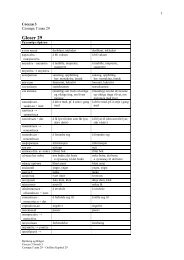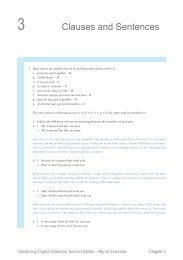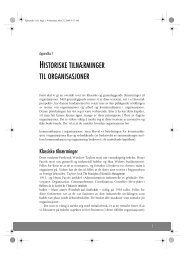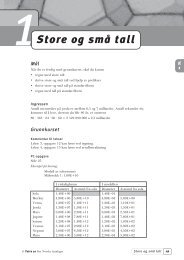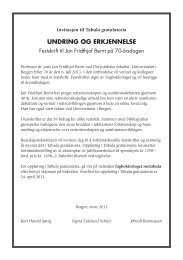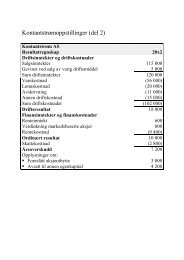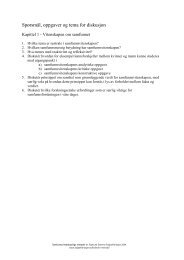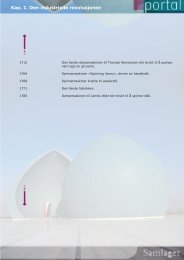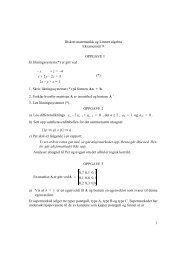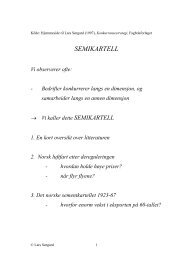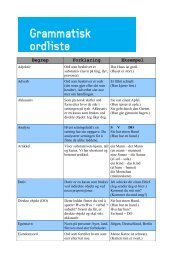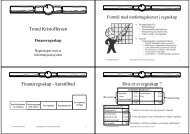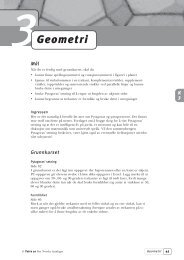10 Verbs, Tense and Aspect - Fagbokforlaget
10 Verbs, Tense and Aspect - Fagbokforlaget
10 Verbs, Tense and Aspect - Fagbokforlaget
Create successful ePaper yourself
Turn your PDF publications into a flip-book with our unique Google optimized e-Paper software.
3 Explain the difference in form <strong>and</strong> meaning between the members of each pair.<br />
a. 1 She walks the dog every night.<br />
2 She is walking the dog tonight.<br />
Sentence 1 has the simple present tense <strong>and</strong> sentence 2 has the present progressive. In addition the time adverbials<br />
are different: in 1, every night describes how often the action takes place, while in 2, tonight refers to “this<br />
evening”. Similarly, the simple present tense is used to describe habitual activity, while the present progressive<br />
describes ongoing, incomplete activity. Sentence 1 thus means that it is her habit to walk the dog every day.<br />
Sentence 2 means that she is not at home at the moment because she is walking the dog.<br />
b. 1 Do you speak Chinese?<br />
2 Are you speaking Chinese?<br />
Sentence 1 is a question about the addressee’s ability to speak Chinese. Sentence 2 is a question about what<br />
language the addressee is speaking at the moment. The reason for the difference is that the simple present tense<br />
refers to permanent states <strong>and</strong> habitual actions, while the progressive refers to ongoing activity.<br />
c. 1 Mr Jones has been to New York.<br />
2 Mr Jones was in New York.<br />
Sentence 1 means that Mr Jones has visited New York at some point, <strong>and</strong> this is relevant at the moment of<br />
speaking. Sentence 2 means that Mr Jones was in New York at some specific time in the past. The meaning<br />
difference is due to the verb phrases: Sentence 1 uses the present perfective, which refers to a past event at<br />
some unspecified time, while sentence 2 has the simple past tense, which refers to an event at a specific (or<br />
specifiable) time.<br />
d. 1 I was going for a walk when the sun came out.<br />
2 I went for a walk when the sun came out.<br />
Sentence 1 contains a verb phrase with the past progressive (was going). This refers to incomplete action. So the<br />
person was just about to go out when the sun started shining. He or she may or may not have taken the walk<br />
in the end. In sentence 2 the simple past tense has been used (went). The combination of a simple past verb<br />
phrase in the main clause with a simple past verb phrase in the dependent clause is interpreted as two actions<br />
following each other, in this case: then sun came out <strong>and</strong> so I went for a walk.<br />
e. 1 Sue was starting up a business.<br />
2 Sue had started up a business.<br />
As in sentence d1, the past progressive in e1 contains a past progressive verb phrase which refers to an incomplete<br />
action. Sue was in the process of starting up a new business. The verb phase in e2 combines past tense<br />
with the perfective aspect (past perfective) <strong>and</strong> thus refers to an action that was completed in the past, before<br />
the time of the “main story”. So Sue had already started up a business, <strong>and</strong> maybe she was now ready to take<br />
on a new project.<br />
4 Read the following text <strong>and</strong> answer the questions below:<br />
In a village near Lyon in south-east France, a couple have become local celebrities by virtue of their adopted “child”.<br />
Digit, as she is known, has been living in the same room as Pierre <strong>and</strong> Elaine Thivillon for nearly 13 years. Their<br />
relationship began in 1999, when the young primate came into the care of the couple, who manage the zoo at Saint<br />
Martin la Plaine where she was born. Within three days of her birth, it was clear that Digit’s mother Pamela was refusing<br />
to feed her. The Thivillons took her into their care, bottle-feeding her during the day <strong>and</strong> returning her to her<br />
enclosure at night.<br />
Introducing English Grammar, Second Edition – Key to Exercises Chapter <strong>10</strong>



